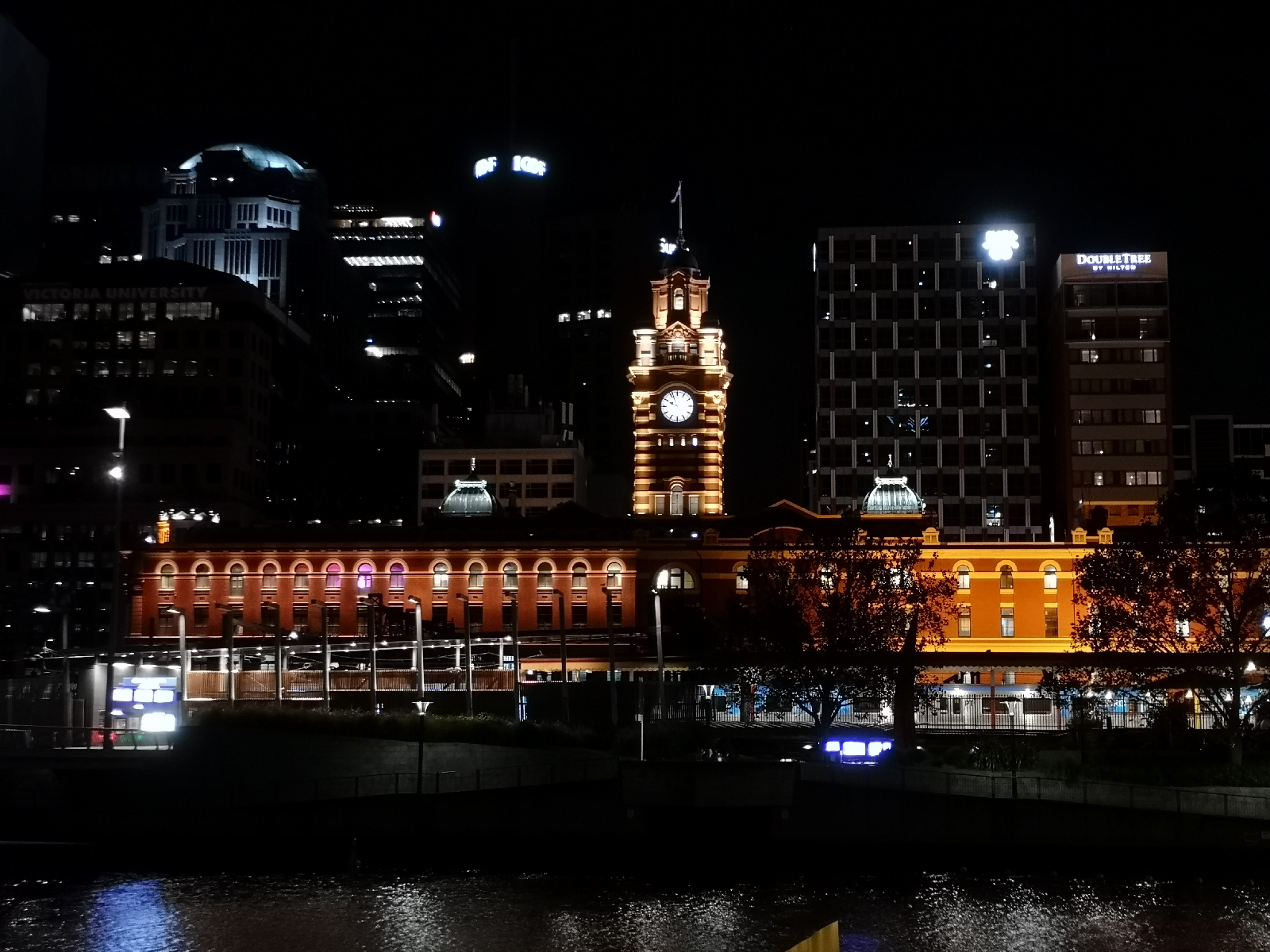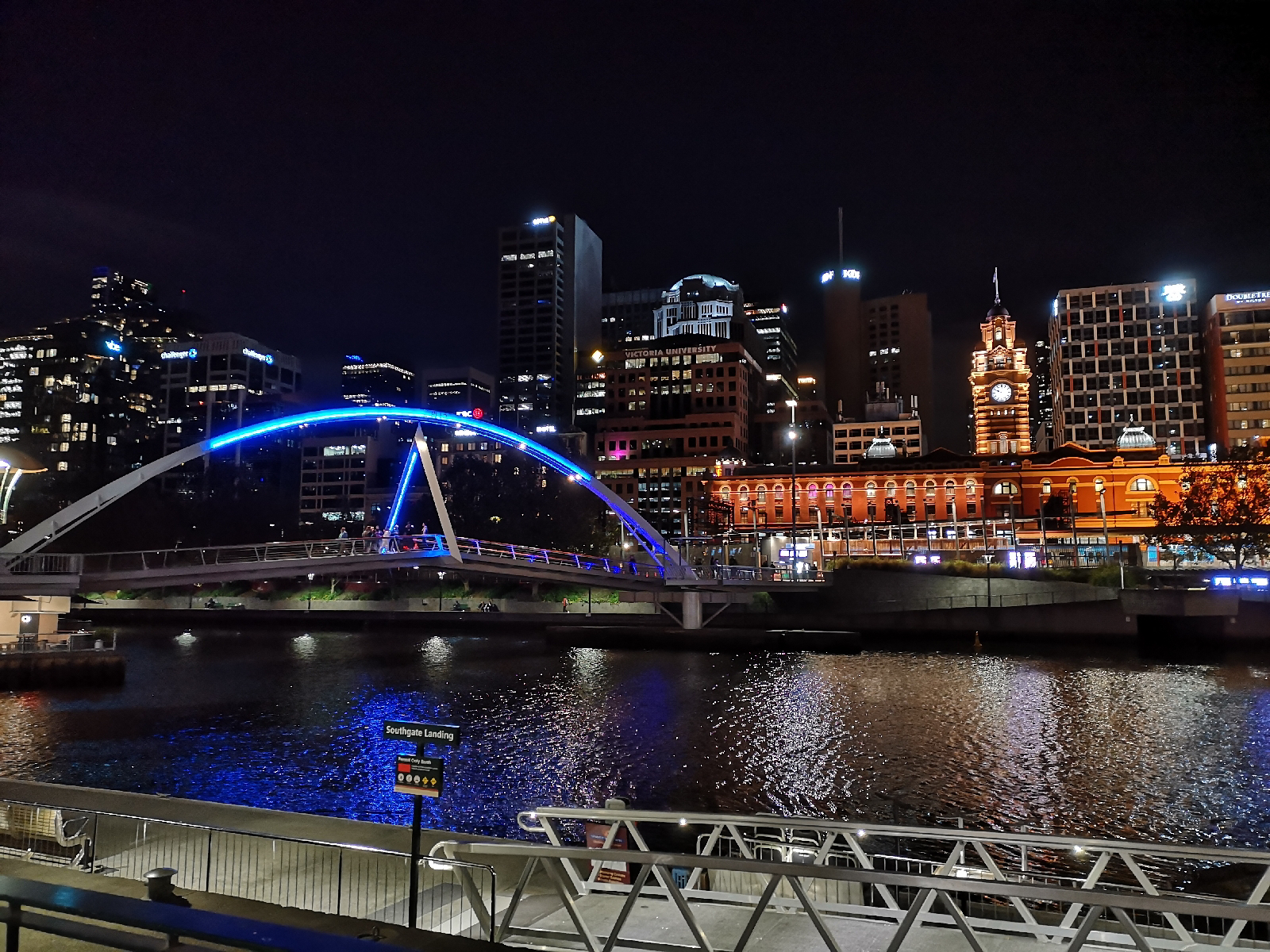Last month we thanked the state government's generous dining enticement (25% rebate for spending of A$40 or more) by dining out at a couple of places in Melbourne CBD. We have cut down on dining-in and switched to take-away since the start of the Covid pandemic unless the venue offers outdoor seating. The venues that we visited did not only have outdoor areas but boast of some of the best views in the city section of the Yarra river.
上個月,託維州政府的福,逢星期一至四在市區用膳滿澳幣40元可申請退回25%消費,所以趁機出外試菜了。疫情以來,外出用膳減少了很多,除非有室外座席,不然一般只敢買外賣。我們試菜的兩個地方,不只是戶外,更臨市區雅拉河畔,地點和景色堪稱一流。Our first outing was on 16 March for the new Yarra Botanica floating restaurant, on its first day of business. It is a barge berthed at a fixed pier at Southbank, with an upper deck and a lower deck that lies very close to the water surface. My wife and I found a spot away from other customers on the lower deck to enjoy our meal.
第一次是3月16日,新河上餐廳Yarra Botanica開張之日。餐廳其實是艘舫,固定地停泊在河的南岸Southbank,舫分兩層,下層貼近水面,我和太太就在面對河中心和市區的一側找個遠離其他顧客的地方坐下用餐。
We ordered a seafood platter which almost qualified for a mini seafood buffet with its variety of food and neat layout.
我們點了一個海鮮拼盤,修長的盤放在桌上,盤上食物林林總總,驟眼看來有如一個小型自助餐。
We took pleasure in enjoying the views with the food, as well as greeting the people who passed by on cruise boats, rowing boats, self-guided electric touring boats and kayaks. Our food probably makes those passers-by jealous and hungry since some of them would have expended a lot of energy for their active pursuits!
面對着河,不止因為開揚的河景令心情舒暢,還可以近距離跟不同「路過」的人打招呼,包括坐遊覽船的,隊際划艇的,開電動艇遊河的,和划獨木舟的,我們羨慕他們的悠遊,他們大概也羨慕我們的食物吧。
Night made its gradual descent during our meal and the buildings in the city lit up one after another. The different colours of the light turned the river into an evolving palette as the wind blowing on the water produced a constantly changing pattern of reflections.
我們抱着悠閒的心情,慢慢品嚐「自動餐」,天色也不經不覺漸黑,墨爾本市區亦逐漸燈火通明,各種顏色的燈光反映在河上。風時大時弱,把水面變成活動的調色板,不斷創造出新款式和變化。
Two weeks later, we visited a Chinese restaurant, also in Southbank, with some relatives. Like us, they have been hesitant about dining indoors since Covid and that place is one of the very few Chinese restaurants that offered outdoor seating and thus a better peace of mind for everyone.
隔了兩星期,親戚約了我們往同樣是位於Southbank的一家中菜館。能找到戶外吃中菜的地方一點也不容易,剛好這家有陽台設座席,空氣較流通,令親戚吃得安心。
The food was of good quality although the portions were on the small side. Boneless fried chicken was rather non-Chinese, however.
當晚菜式還算不錯的,只是份量稍小,風沙雞沒有骨則有點令我不慣,更令我想起可能是為了遷就西人而改造。
I hoped to take a few pictures of the views from the balcony but was hindered by a transparent plastic shield installed on the balcony to block out the wind because of reflection of indoor lighting. Thankfully my wish was fulfilled after the meal as we walked out of the restaurant: we were greeted by the view of Flinders Street station, prominently lit up against the dimmed city buildings and putting its classic architecture and style in full display. It was a pleasant surprise for us and we snapped selfies excitedly with the station in the background. We all thought that it was the best night view that Melbourne could possibly offer.
坐陽台本來另一個好處,就是可以欣賞對出的河景並多加拍攝,可惜當晚因大風,陽台安裝了一層透明的擋風板,拍夜景時會拍到室內燈光的反映,所以只好忍一下手。但飯後離開館子,迎面的景色,正是在夜間發亮的Flinders Street火車站,散發出古典味,其燈光和建築,在市區稍暗的現代高樓襯托下比白天更是突出,為我們帶來驚喜:這應該是全墨爾本夜景最美的地方了!我們很雀躍地以火車站為背景,自拍了好一會。
We haven't indulged in city dining for ages and couldn't have asked for more!
我們好久沒這樣享受了,佳餚配以美景,確是人生樂事。












Comments